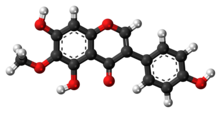|
Tectorigenin

|

|
| Names
|
| IUPAC name
4′,5,7-Trihydroxy-6-methoxyisoflavone
|
Systematic IUPAC name
5,7-Dihydroxy-3-(4-hydroxyphenyl)-6-methoxy-4H-1-benzopyran-4-one |
| Other names
Tectorigenine
|
| Identifiers
|
|
|
|
|
|
|
| ChEBI
|
|
| ChEMBL
|
|
| ChemSpider
|
|
| ECHA InfoCard
|
100.208.621 
|
| KEGG
|
|
|
|
|
| UNII
|
|
|
|
|
InChI=1S/C16H12O6/c1-21-16-11(18)6-12-13(15(16)20)14(19)10(7-22-12)8-2-4-9(17)5-3-8/h2-7,17-18,20H,1H3  N NKey: OBBCRPUNCUPUOS-UHFFFAOYSA-N  N NInChI=1/C16H12O6/c1-21-16-11(18)6-12-13(15(16)20)14(19)10(7-22-12)8-2-4-9(17)5-3-8/h2-7,17-18,20H,1H3 Key: OBBCRPUNCUPUOS-UHFFFAOYAZ
|
COC1=C(C=C2C(=C1O)C(=O)C(=CO2)C3=CC=C(C=C3)O)O
|
| Properties
|
|
|
C16H12O6
|
| Molar mass
|
300.266 g·mol−1
|
Except where otherwise noted, data are given for materials in their standard state (at 25 °C [77 °F], 100 kPa). |
Chemical compound
Tectorigenin is an O-methylated isoflavone, a type of flavonoid. It ha been isolated from leopard lily (Belamcanda chinensis),[1] Algerian iris (Iris unguicularis)[2] and East Asian arrowroot (Pueraria thunbergiana).[3]
Glycosides
Tectoridin is the 7-glucoside of tectorigenin.
See also
References
- ^ Thelen, Paul; Scharf, Jens-Gerd; Burfeind, Peter; Hemmerlein, Bernhard; Wuttke, Wolfgang; Spengler, Barbara; Christoffel, Volker; Ringert, Rolf-Hermann; Seidlová-Wuttke, Dana (2005). "Tectorigenin and other phytochemicals extracted from leopard lily Belamcanda chinensis affect new and established targets for therapies in prostate cancer". Carcinogenesis. 26 (8): 1360–1367. doi:10.1093/carcin/bgi092. PMID 15845653.
- ^ Atta-Ur-Rahman; Hareem, Sumaira; Iqbal Choudhary, M.; Sener, Bilge; Abbaskhan, Ahmed; Siddiqui, Hina; Anjum, Shazia; Orhan, Ilkay; Gurbuz, Ilhan; Ayanoglu, Filiz (2010). "New and Known Constituents from Iris unguicularis and Their Antioxidant Activity". Heterocycles. 82: 813. doi:10.3987/COM-10-S(E)6.
- ^ Lee, Kyung-Tae; Sohn, Il-Cheol; Kim, Young-Kwan; Choi, Jung-Hye; Choi, Jong-Won; Park, Hee-Juhn; Itoh, Yoshie; Miyamoto, Ken-Ichi (2001). "Tectorigenin, an Isoflavone of Pueraria thunbergiana BENTH., Induces Differentiation and Apoptosis in Human Promyelocytic Leukemia HL-60 Cells". Biological and Pharmaceutical Bulletin. 24 (10): 1117–1121. doi:10.1248/bpb.24.1117. PMID 11642314.
|

